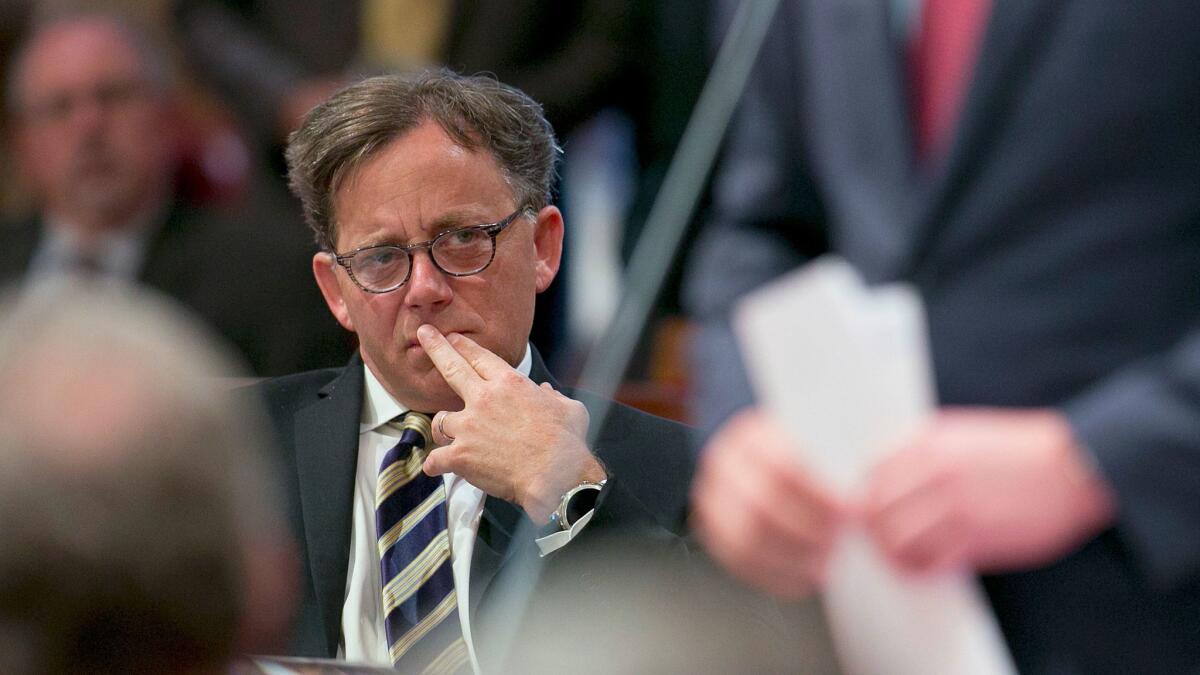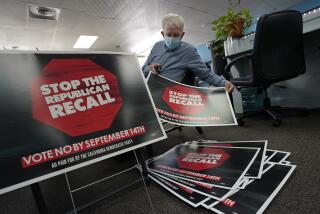A new suit says lawmakers broke the law when they changed California’s recall election rules

Sacramento — Republican activists and an anti-tax organization filed a lawsuit Thursday to scrap a new law that revised the rules for California’s recall elections, accusing Democrats of a blatant attempt to help an embattled state senator keep his job.
The court challenge to the law, enacted as part of last month’s new state budget, comes after critics of state Sen. Josh Newman (D-Fullerton) submitted some 85,000 voter signatures to force a special election on whether he should be removed from office.
“For them to come in and try to pass a law undercutting a legitimate exercise of direct democracy, we feel that the court’s not going to like that very much,” said Jon Coupal, president of the Howard Jarvis Taxpayers Assn., one of the plaintiffs in the lawsuit.
Newman, elected to the Senate in 2016 after narrowly defeating his GOP opponent, became the target of the recall campaign after voting in April for a $52-billion transportation package that includes both new fuel taxes and an additional annual fee for vehicle owners.
That effort then prompted legislative Democrats to add a provision to the state budget, extending the amount of time between a recall petition effort and the actual election. The new law also gives voters a chance to remove their signatures from the petition, as Democrats have accused supporters of the Newman recall effort of misleading voters into thinking a special election would be focused on repealing the new gas tax.
Political Road Map: It’s easy to slip all kinds of things into California’s budget »
The lawsuit focuses on a different provision in the law, one that requires a new review of a recall election’s cost by the state Department of Finance — a provision that offers no specifics on how long a review might last.
“The recall was meant to be a quick remedy,” Coupal said. “This is directly contrary to the intent.”
In a recall election, voters are given a two-part ballot: whether to keep or remove the elected official, and then a list of replacement candidates should the incumbent lose. No candidates have come forward as potential replacements for Newman.
Backers of the effort hope to force a special election this fall in the district, based primarily in Orange County but including portions of Los Angeles and San Bernardino counties. They argue that legislative Democrats only revised the existing election law in order to consolidate a recall with next June’s statewide primary — which would be more than a year after the effort to remove Newman had begun.
Standalone special elections historically have seen very low voter turnout, and those who do cast ballots often boost conservative causes and candidates. Democrats hold a paper-thin advantage in voter registration in Newman’s district, which was an open seat in 2016 that formerly had been represented by a Republican.
The recall effort is seen as both a proxy fight over the new transportation taxes and the showdown between the state’s major political parties after the election of President Trump. Campaign finance records show more than $2 million either has been spent or raised on the effort, most of it coming from Democratic-aligned groups wanting to help Newman hold on to the seat.
The lawsuit argues that even if Democrats wanted to change the state’s recall laws, they unfairly made it retroactive and thus attempted to rewrite the rules long after petition circulators had collected most of the signatures needed to force an election. The plaintiffs point out that recall elections are supposed to be held in a timely manner. They argue that the law could effectively make it impossible to remove members of the state Assembly, given they are elected to terms of just two years.
Recall elections are rare in California, the most notable being the ouster of former Gov. Gray Davis in October 2003. The new law covers all elected offices, both statewide officials and legislators.
The lawsuit also alleges that the budget-related bill violated established state law that limits the number of specific expenditures or subjects that can be contained in any single piece of legislation. Gov. Jerry Brown, who signed the bill into law June 27, later called it an “eminently reasonable” change to the recall process.
Follow @johnmyers on Twitter, sign up for our daily Essential Politics newsletter and listen to the weekly California Politics Podcast
ALSO:
Lawmakers approve changes to California election law after a bitter budget debate
Campaign to recall Newman submits more than enough signatures to force a special election
Updates on California politics
More to Read
Get the L.A. Times Politics newsletter
Deeply reported insights into legislation, politics and policy from Sacramento, Washington and beyond. In your inbox three times per week.
You may occasionally receive promotional content from the Los Angeles Times.











